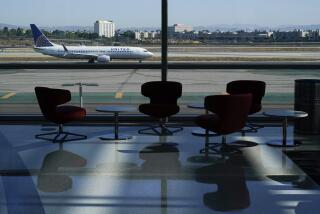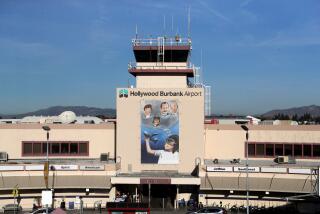Airport Board Agrees to Cut Size of Terminal
- Share via
Trying to reach a compromise, Burbank Airport officials agreed Wednesday to cut the size of a proposed new passenger terminal but balked at a proposal to limit the airport’s “noise footprint” to its current 290 acres.
On a 5-4 vote, the Burbank-Glendale-Pasadena Airport Authority approved a measure to cut the size of the planned 330,000-square-foot terminal to 275,000 square feet.
The measure counters a proposal by Burbank to scale down the terminal to 250,000 square feet in an attempt to appease residents concerned about an increase in airport operations.
But while the airport’s governing board appeared to be ready to deal over terminal size, it balked at other provisions.
Burbank is proposing capping the airport’s noise footprint--the area where average noise levels exceed 65 decibels--at its current size.
It also wants to change the way average noise levels are measured, throwing out the California Noise Equivalent Level scale used by the airport. Peter Kirsch, special counsel for Burbank on airport issues, said the city wants a scale that measures noise for the 15 hours that the airport is in operation, instead of over a 24-hour period.
Burbank city leaders contend the airport would have more flexibility to grow as long as noisier aircraft are replaced with quieter ones.
But airport officials object to the standards because they believe it would limit flights and therefore growth at the airport.
Airport Executive Director Dios Marrero said Burbank’s proposal for a new standard of noise measurement is not used by the state and is not necessary because the airport’s noise footprint is smaller than the 370-acre area allowed by state law.
“There’s already a noise ceiling at this airport that is more restrictive than those that apply to other airports in California,” Marrero said.
Authority members also objected to a Burbank proposal that any capital project or contract in excess of $100,000 require a two-thirds vote of the authority, if passenger levels increased to 5.2 million passengers annually, from 4.7 million today.
The two proposals come amid stalled talks over the terminal and nearly a year after a historic agreement signed by the airport and the city to replace the terminal.
For the last two decades, the airport has been trying to replace its 1930s-era building, which federal officials say is too close to the runway under modern safety standards. After acrimony and numerous lawsuits, the airport and city were on the verge of a compromise. But opposition to the so-called “Framework for Settlement,” from the Federal Aviation Administration, local residents and the airlines quickly surfaced.
Critics blasted the plan, which included imposing a de facto curfew without the federally required noise study, simply by closing the passenger terminal between 11 p.m. and 6 a.m. but not shutting down the runways. They also assailed plans to permanently ban easterly takeoffs.
Eventually, negotiations for terminal construction sputtered and city and airport officials missed a May 24 deadline for approving a new terminal, launching a process that could eventually result in the sale of land earmarked for the $300-million project.
More to Read
Sign up for Essential California
The most important California stories and recommendations in your inbox every morning.
You may occasionally receive promotional content from the Los Angeles Times.













